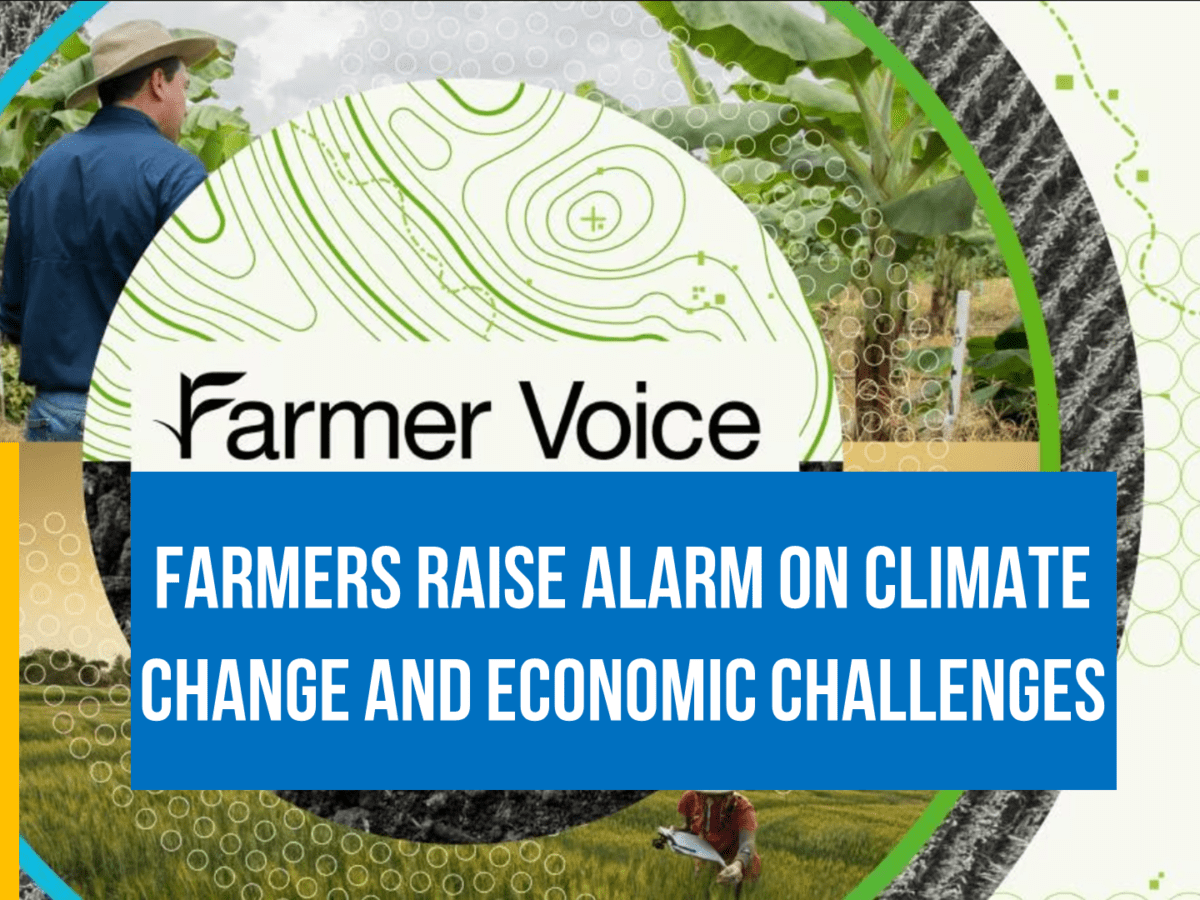Global Study: Farmers Raise Alarm on Climate Change and Economic Challenges

In the ever-evolving world of agriculture, one resounding message reverberates: farmers worldwide are grappling with the relentless impacts of climate change and economic pressures. These findings are the heart of the “Farmer Voice” survey, a comprehensive study commissioned by Bayer, a life science company, and conducted by an independent agency. It’s a clarion call to action for the global agricultural community, as well as a testament to the resilience and adaptability of those who tend the Earth’s fields.
Climate Change Takes Center Stage
The survey paints a stark picture of the challenges faced by farmers across the globe. A staggering 71% of respondents affirmed that climate change has already left a substantial mark on their farms, and an even larger majority expressed concern about its impending consequences. Specifically, 76% of farmers worldwide voiced their anxieties about the potentially devastating effects of climate change, with Kenyan and Indian farmers emerging as the most concerned.
These concerns are not unfounded. Climate change has led to a surge in pest and disease pressure, as reported by a significant 73% of those surveyed. Moreover, farmers estimate a disheartening 15.7% reduction in their incomes over the past two years directly attributed to climate change. Alarmingly, one in six farmers has faced income losses exceeding 25% during this period, a somber testament to the profound impact of climatic shifts.
Rodrigo Santos, a Member of the Board of Management of Bayer AG and President of the Crop Science Division, emphasized the gravity of the situation. “Farmers are already experiencing the adverse effects of climate change on their fields, and at the same time, they play a key role in tackling this huge challenge,” he noted. Santos underlined the urgent need to put farmers’ voices at the forefront of global discussions, recognizing the threat climate change poses to global food security.
Economic Challenges Compound the Pressure
While climate change takes center stage, economic challenges loom large on the horizon. Over the next three years, economic concerns top the list of priorities for farmers, with 55% naming fertilizer costs among their top three challenges. Energy costs (47%), price and income volatility (37%), and the cost of crop protection (36%) follow closely behind. This concern is particularly pronounced in countries like Kenya, India, and Ukraine, where farmers grapple with the dual burden of economic challenges and climate change impacts.
For Ukrainian farmers, fertilizer costs are especially burdensome, with 70% citing it as a top challenge, mirroring the broader economic struggles faced by the country due to ongoing disruptions. Notably, 40% of Ukrainian farmers also mentioned the general disruption caused by the ongoing conflict as a significant challenge.
Innovations to Combat Climate Change
Farmers are not merely passive victims of climate change and economic challenges; they are actively seeking solutions. More than 80% of surveyed farmers are already implementing or planning measures to reduce greenhouse gas emissions. Cover crops (43%), renewable energy or biofuels (37%), and innovative seeds to reduce fertilizer or crop protection use (33%) are top priority areas for sustainability efforts. Additionally, biodiversity conservation is a focal point, with 54% of farmers applying or planning measures to protect insects.
In terms of technology and innovation, farmers are eager for access to seeds and traits designed to withstand extreme weather conditions (53%), improved crop protection technology (50%), and better access to irrigation technology (42%). Improving land use efficiency, crop diversification, and soil health are also key strategies identified by farmers to secure a sustainable future.
Spotlight on Indian Smallholder Farmers
In a unique addition to the global survey, Bayer interviewed 2,056 Indian smallholder farmers, shedding light on the unique challenges faced by this critical demographic. While labor and fertilizer costs are their primary concerns, they also grapple with climate change-induced challenges such as reduced crop yields (42%) and increased pest pressures (31%). To mitigate these risks, Indian smallholders prioritize financial security through insurance (26%) and infrastructure improvement (21%).
Looking ahead, 60% of Indian smallholders believe that access to digital technologies and modern crop protection would be the most beneficial for their farms. Despite the challenges they face, a remarkable 80% of these smallholders remain optimistic about the future of farming.
A Global Consensus
The “Farmer Voice” survey stresses the global consensus among farmers on the pressing issues of climate change and economic pressures. While some variations exist between countries, the overarching concerns remain consistent. Rodrigo Santos concluded, “Farmers are facing multiple and related challenges. But despite this, we found that they are hopeful – almost three-quarters say they feel positive about the future of farming in their country.”
These survey results serve as a potent call to action for the entire food system to innovate, collaborate, and deliver the solutions that farmers urgently need. With a growing world population and limited time to address these issues, the global community must prioritize sustainable agriculture practices to ensure the resilience and prosperity of farming in the face of adversity.
The “Farmer Voice” survey, encompassing 800 farmers from eight countries, offers a crucial glimpse into the challenges and aspirations of those who feed the world. Conducted independently and anonymously, the survey offers unfiltered insights that demand our attention. As we navigate an uncertain future, it’s clear that the voices of farmers must be heard, and their concerns addressed promptly.



